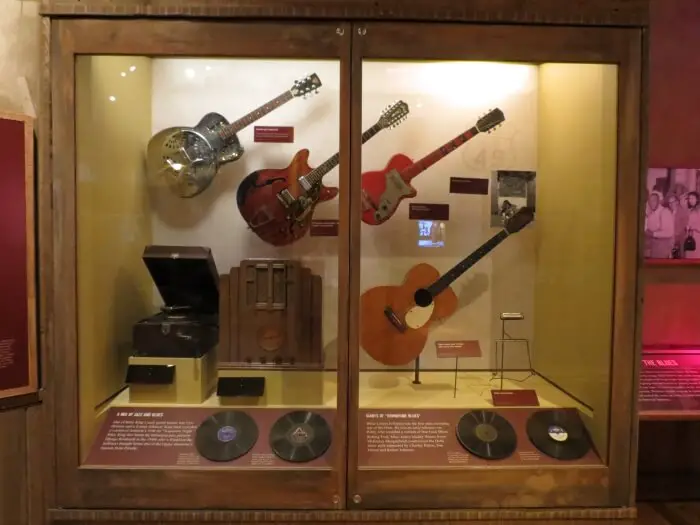
Neither Elvis Presley nor BB King ever realised their ambitions. For the young Elvis it was to be a member of a gospel quartet. And as BB King explained: ‘I was going to have me a little farm. I could picture seeing myself farming, picture seeing a beautiful woman with my two or three kids coming out and bringing me some water. Those were my dreams.’
Those words are on display in the wonderful BB King Museum in Indianola, Mississippi, not far from where BB was born as Riley King. The word ‘wonderful’ is apt because it is a building full of wonder – the wonder of the man’s powerful and moving blues music, and the wonder of how he survived his childhood. It’s the kind of museum that lets you get intimately acquainted with the musician, from his dirt poor Mississippi roots to his worldwide success.
He was born 16 September 1925. His parents separated when he was four. He then lived with his mother and walked six miles to a one-room schoolhouse where the children relied on a local woman making them soup or beans for lunch. When Riley was nine his mother died, possibly from diabetes. She was in her late twenties. He went to stay with his grandmother, who died five years later. He stayed alone on her farm for several months till word reached his father, who went and fetched him into his new family.
‘I would give nearly any amount of money today to have a picture of my mom,’ he said later. The museum is full of personal touches like this, and brilliantly weaves the life of the musician with the life of the Mississippi Delta that shaped him.

BB King’s Tour Bus Parked Outside the Museum
At the age of 12 he had bought his first guitar, after learning his first three chords from the minister in the church he attended, mainly for its music. Riley eventually got a job driving a tractor on a plantation in Indianola, and started playing street corners on a Saturday night, where he earned enough money to rival his farm wages. He could then afford to pay to see people like Count Basie and Louis Jordan perform. One day he said, ‘Come hell or high water, I’m going to Memphis.’
Memphis was the magnet for every blues musician. In 1946 he got his wish to go there, but not in the way he wanted. An accident snapped off his tractor’s exhaust stack and Riley thought his boss would never forgive him so he left a note and ran away to Memphis.
‘Memphis to me then was like the Eiffel Tower,’ he said, ‘or the Tower of Pisa, or the Grand Canyon.’
He returned to Indianola a year later, having discovered he still had a lot to learn about playing the guitar. So he practised some more and went back to Memphis, and this time was ready for Beale Street.
‘If you could be black for one Saturday night on Beale Street, never would you want to be white again,’ said musician Rufus Thomas.

BB was offered a radio spot provided he would DJ as well, and that’s where he got his famous name. He was nicknamed the Beale Street Blues Boy, which got abbreviated to Bee-Bee. He began making records in Memphis and in 1952 recorded ‘3 O’Clock Blues’, and from then on he never stopped having hits till his death at age 89 in May, 2015.
The BB King Museum is a fitting tribute to the blues legend as, like the man himself, it is steeped in history while being thoroughly modern. The displays on his childhood and schooling are moving, and a broader picture of Delta life at the time is built up. Memphis comes alive, and after his success one section covers his Life on the Road, while opposite is one covering Jim Crow on the Road. Here there’s a copy of The African-American Travel Guide, and The Travel Guide of Negro Hotels and Guesthouses, both from the 1950s.

More uplifting are items like BB’s personal notebook, from which he would memorise song lyrics and learn chord progressions. There are guitars, of course, and stage suits. One cabinet collects together his honors, while his home studio (above) has also been installed here. Budding blues musicians can use a recording machine with a guitar attached so they can ‘Play it Like BB’, although of course no-one could play it like BB.

The museum takes the story as far as 2008, when it opened, but a new extension is being built to bring the story up-to-date, with more artifacts received from BB King’s estate. The great blues man is also buried here, and the new wing, due to open in 2016, will also be a memorial around his grave.
Elvis and BB King may not have achieved their youthful ambitions, but they didn’t do badly. Elvis became the King of Rock ‘n’ Roll, and BB the King of the Blues. Not bad for a poor white boy and a poor black boy from rural Mississippi.
More Information
See the BB King Museum website.
For further information about Mississippi and travel in the Deep South generally see www.deep-south-usa.com and www.visitmississippi.org.
Photos
All photos (c) Donna Dailey.

I disagree, read:
http://photos.dailynews.com/2016/08/photos-remembering-king-of-rock-n-roll-elvis-presley/
– Belen